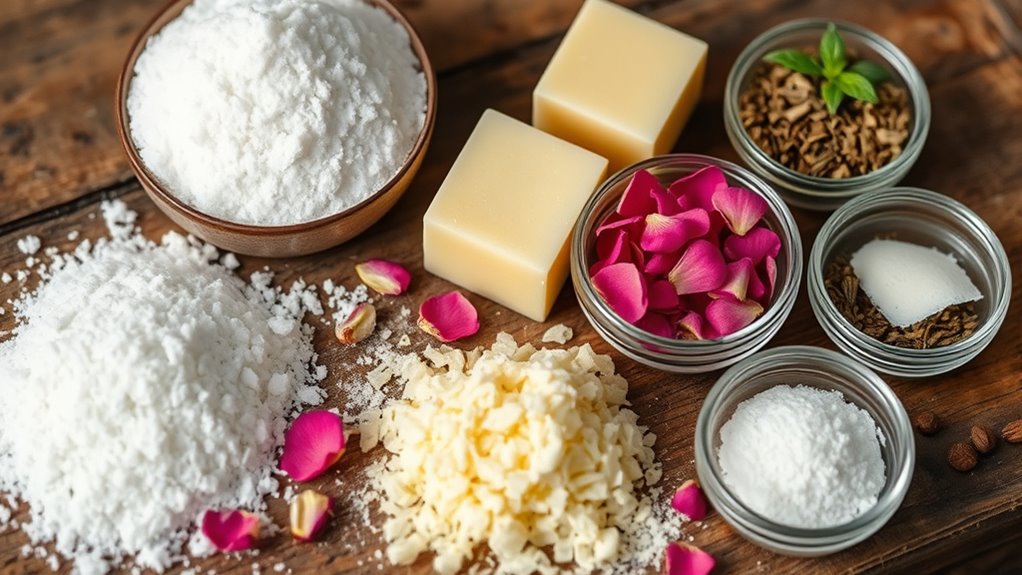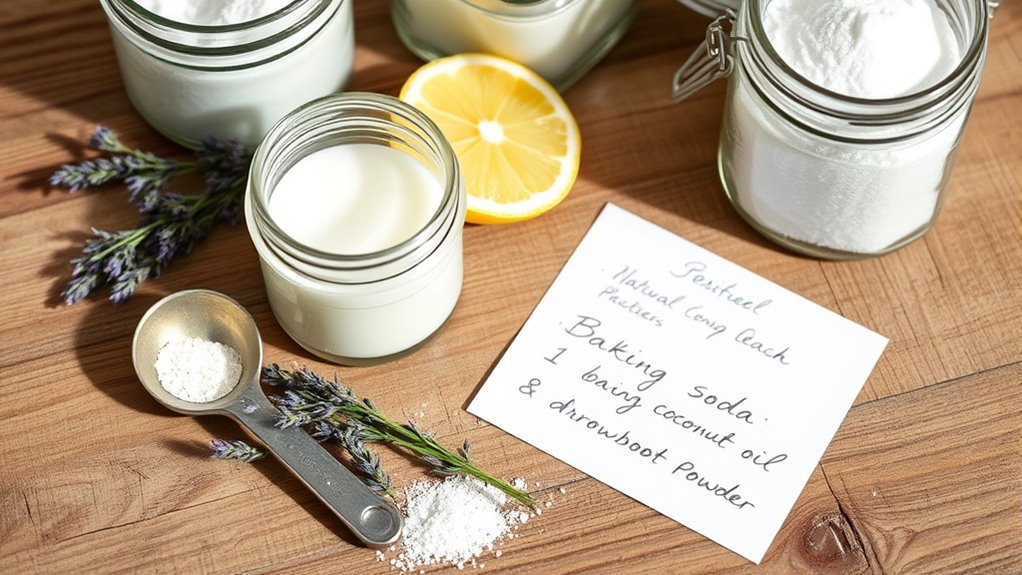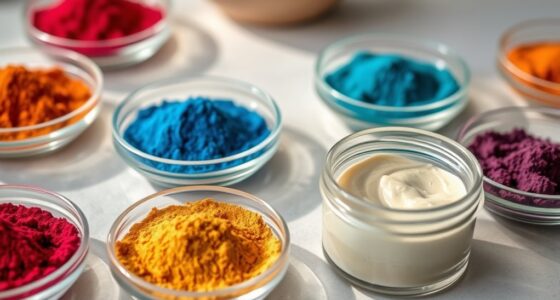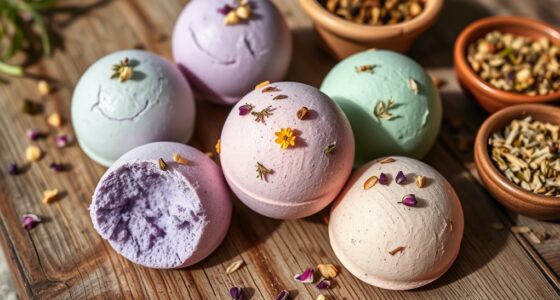To make safe, effective DIY natural deodorant, choose high-quality ingredients like coconut oil, arrowroot powder, and essential oils such as lavender or tea tree. Be mindful of baking soda amounts if you have sensitive skin, and always do a patch test first. Use clean utensils and store your deodorant in a cool, dry place to prevent contamination. For more detailed tips on ingredient safety and customizing your blend, keep exploring.
Key Takeaways
- Use gentle ingredients like arrowroot powder and reduce baking soda for sensitive skin.
- Conduct patch tests before full application to prevent irritation.
- Prioritize organic, high-quality ingredients such as unrefined coconut oil and pure essential oils.
- Store deodorant in a clean, sealed container in a cool, dry place to maintain safety.
- Adjust ingredient ratios to personalize scent and effectiveness while ensuring skin compatibility.

If you’re looking to avoid store-bought deodorants filled with chemicals, making your own natural alternative is simple and rewarding. You gain control over what goes on your skin, choosing ingredients that are gentle and safe. This is especially important if you have skin sensitivity or allergies, as many commercial deodorants contain artificial fragrances, parabens, and other harsh chemicals that can cause irritation. By opting for chemical free options, you reduce the risk of adverse reactions and create a product tailored to your needs. Plus, homemade deodorant is cost-effective and customizable, allowing you to adjust scents and ingredients to suit your preferences.
When selecting ingredients, focus on those known for their natural deodorizing and skin-soothing properties. Baking soda, for instance, helps neutralize odor, but if you have sensitive skin, you might want to reduce its amount or substitute it with arrowroot powder or cornstarch, which are gentler options. Coconut oil is a popular base because it’s antimicrobial and moisturizing, making it ideal for soothing skin irritation and providing a smooth application. Shea butter and beeswax can add extra moisture and stability, creating a creamy consistency that’s easy to apply. Essential oils like lavender, tea tree, or lemon not only fragrance your deodorant but also offer antimicrobial benefits, helping to keep odor-causing bacteria at bay.
Safety should always be a priority when making DIY deodorant. Before applying a new mixture, do a patch test on a small area of skin to check for any adverse reactions, especially if you have sensitive skin or known allergies. Use clean utensils and containers to prevent contamination, and store your homemade deodorant in a cool, dry place to maintain freshness. If you notice any irritation or discomfort after use, discontinue immediately and consider adjusting your recipe or ingredients. Remember, everyone’s skin reacts differently, so it may take some experimentation to find the perfect balance of ingredients that work for you.
Lastly, be mindful of ingredient quality. Opt for organic, unrefined options whenever possible to avoid pesticides and additives. This ensures your deodorant remains as natural and chemical free as possible, aligning with your goal of a healthier, safer personal care routine. Making your own deodorant empowers you to create a product that’s gentle, effective, and free of harmful chemicals, all while catering specifically to your skin’s needs. With a little practice, you’ll find a routine that keeps you fresh and confident without compromising your health.
Frequently Asked Questions
Can Homemade Deodorants Effectively Prevent Odor All Day?
Homemade deodorants can provide long-lasting effectiveness and natural odor control, but results vary depending on ingredients and your body chemistry. You might find they work well for you, especially if you choose ingredients like baking soda or arrowroot powder. To maximize effectiveness, apply it thoroughly and reapply if needed. Keep in mind that some people may need to experiment with different recipes to find the best natural solution for all-day odor prevention.
Are There Any Ingredients to Avoid Due to Allergies?
Sure, avoid ingredients like baking soda if you have baking soda sensitivity or fragrances if you suffer from fragrance allergies. Your skin isn’t a fan of surprises, after all. Some folks find that baking soda causes irritation, and fragrances can trigger allergic reactions. So, skip the mystery ingredients and opt for soothing, hypoallergenic options. Your armpits will thank you for the allergy-aware care, not for playing hide-and-seek with irritation.
How Long Does Homemade Deodorant Typically Last?
Your homemade deodorant typically lasts about 1 to 3 months, depending on ingredients and storage. To maximize shelf life, store it in a cool, dry place away from direct sunlight. Use a clean spatula or your fingers to apply, avoiding water contamination. Proper storage tips help prevent spoilage and maintain effectiveness, ensuring your natural deodorant stays fresh and safe to use during its shelf life.
Is It Safe to Use Essential Oils for Sensitive Skin?
Yes, it’s safe to use essential oils for sensitive skin if you properly dilute them. Always follow recommended essential oil dilution guidelines, typically 1-2% for sensitive skin. Test a small patch first to check for reactions. If you notice redness or irritation, discontinue use. Using diluted essential oils minimizes skin sensitivity risks and allows you to enjoy their benefits safely in your homemade deodorant.
Can DIY Deodorants Cause Skin Irritation or Rashes?
Yes, DIY deodorants can cause skin irritation or rashes if you’re sensitive to certain ingredients. You might experience allergy triggers or ingredient sensitivities, especially with baking soda or essential oils. To minimize risks, do a patch test before applying a new homemade deodorant extensively. If you notice redness, itching, or rash, discontinue use and try gentler ingredients. Always pay attention to your skin’s reactions and adjust your recipe accordingly.
Conclusion
By choosing DIY natural deodorant, you’re embracing safety, sustainability, and self-care. You’re nourishing your skin, protecting the environment, and trusting what you put on your body. You’re empowering yourself to make healthier choices, reducing exposure to harmful chemicals, and embracing a more natural lifestyle. So, take control, make your own deodorant, and enjoy the confidence that comes from knowing you’ve created something safe, simple, and truly your own. Your well-being and the planet will thank you.








